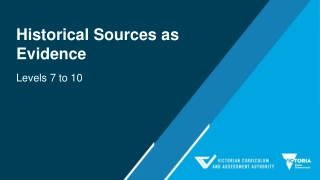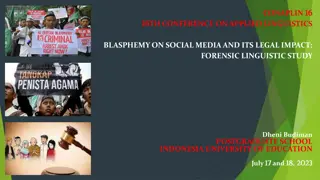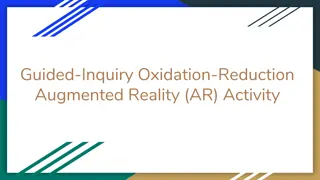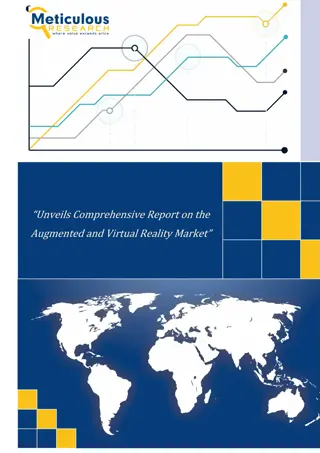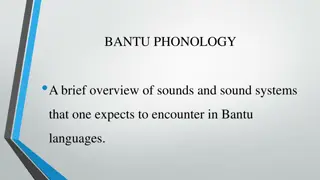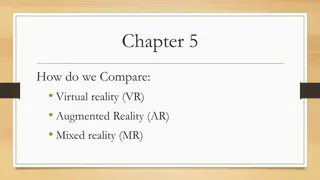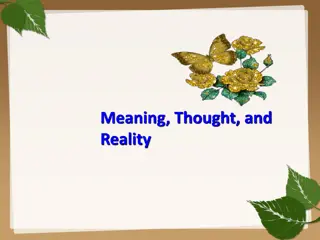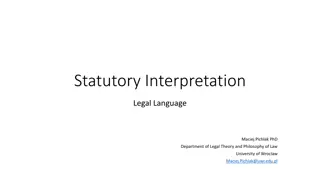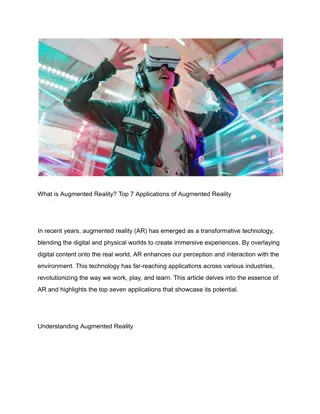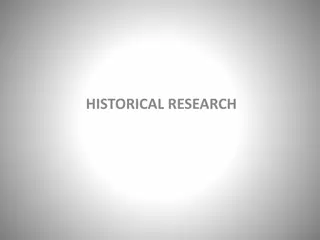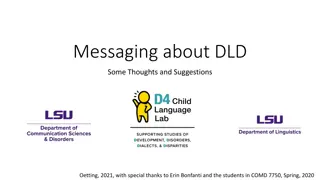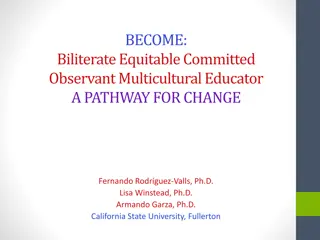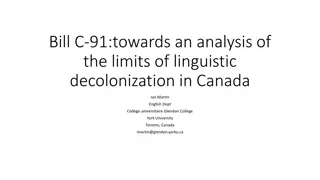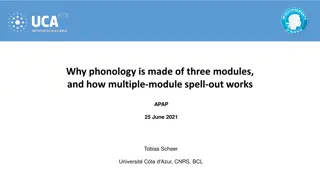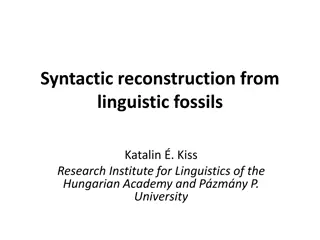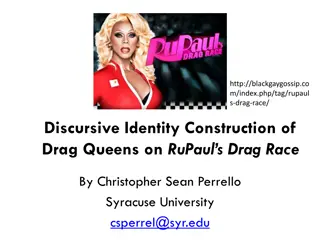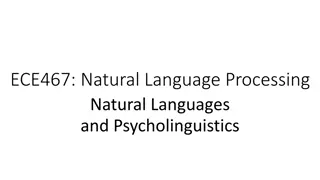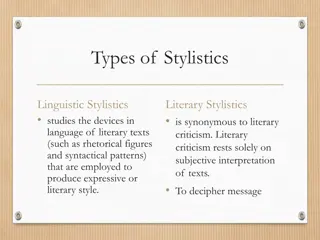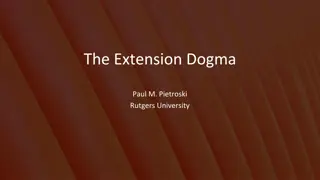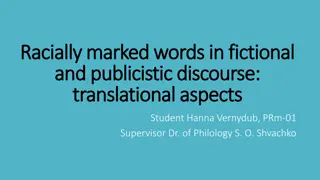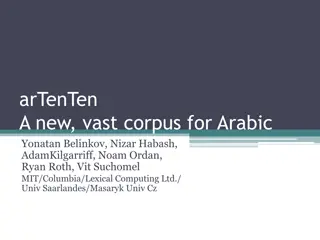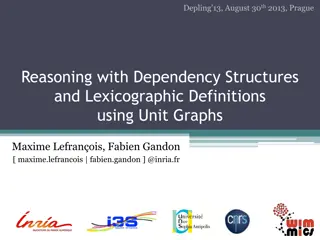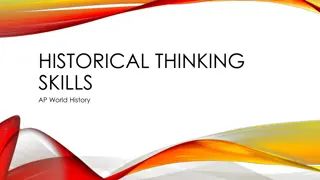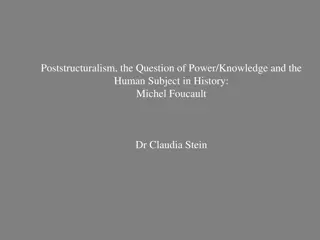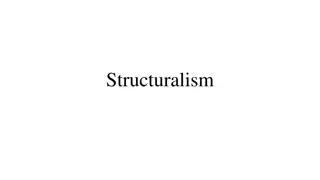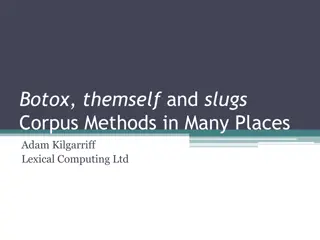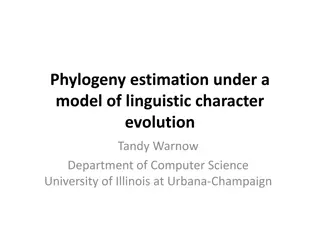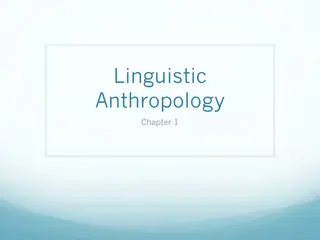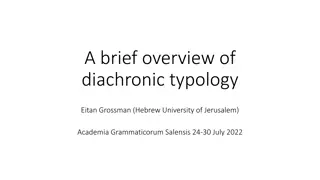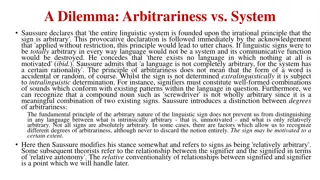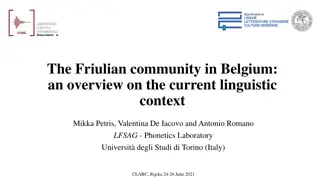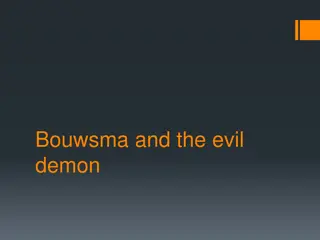Augmented Reality & Virtual Reality
The concepts and applications of augmented reality and virtual reality in the Department of Computer Science & Electronics. Discover the benefits and limitations of these technologies.
8 views • 14 slides
Exploring the Intersection of Technology and Entertainment
The entertainment landscape is constantly evolving, propelled by technological advancements that redefine \nhow we engage with stories and immerse ourselves in fictional worlds. While Virtual Reality (VR) offers \ncomplete immersion in a digital environment, and Augmented Reality (AR) overlays digit
2 views • 3 slides
Historical Sources as Evidence
Explore the importance of historical sources as evidence in the Victorian Curriculum History context, focusing on how students analyze, evaluate, and utilize sources to create historical explanations and arguments. Discover the significance of primary and secondary sources, perspectives of historica
1 views • 46 slides
Evolution of Virtual Reality: Past, Present, and Future Insights
Discover the intriguing history and definitions of Virtual Reality (VR) in this comprehensive lecture. From Burdea's components of VR to Sutherland's vision of the Ultimate Display, explore the essence of immersive experiences and the fusion of technology and human interaction. Uncover the transform
2 views • 40 slides
Perspectives on Reality: Idealism vs. Materialism in Philosophy
Philosophy delves into fundamental questions about existence and reality. This lecture explores contrasting viewpoints of idealism, which posits that reality is mental, and materialism, which argues reality is physical. Examples from philosophers like George Berkeley and Karl Marx exemplify these pe
1 views • 12 slides
Impact of Blasphemy on Social Media: Forensic Linguistic Analysis
Language plays a crucial role in human communication, especially on social media platforms where public speech can have legal consequences. This research delves into the concept of blasphemy on social media and its legal implications, focusing on linguistic forensic study. It explores how language c
7 views • 24 slides
Augmented Reality Oxidation-Reduction Activity Breakout Session
Engage in an interactive guided inquiry session on oxidation-reduction reactions using augmented reality technology. The session includes team tasks and discussions related to lithium-ion electric car batteries, with designated roles for each member. Participants will access Google Docs for collabor
10 views • 8 slides
Anthropology of the Senses: Holistic Understanding in Virtual Reality
Exploring the importance of a holistic approach in understanding virtual reality through the valorization of human experiences and the incorporation of multisensory signals. The discussion highlights the historical perspective on the role of senses beyond just vision, emphasizing the need to acknowl
4 views • 23 slides
The Impact of Reality Television on Society
Reality television, where fact is sometimes stranger than fiction, has a significant influence on society. This form of entertainment often showcases ordinary people in various scenarios, leading to desensitization and acceptance of negative behaviors like aggression and bullying. The ethical implic
7 views • 17 slides
Vinz Global's Expertise in Mixed Reality Game Development
The impact of Vinz Global's mixed reality & game development initiatives is evident in the immersive and engaging experiences it delivers to players worldwide. By pushing the boundaries of technology and creativity, Vinz Global inspires imagination, fosters learning, and entertains audiences of all
4 views • 4 slides
Unveils Comprehensive Report on the Augmented and Virtual Reality Market
Augmented and Virtual Reality Market by Type (Augmented Reality, Virtual Reality), Offering (Hardware, Software), Device (AR Devices, VR Devices), Application (Health and Safety, Training), End-use Industry and Geography - Global Forecast to 2030\n
0 views • 4 slides
Challenges and Solutions in Implementing Historical Competencies in Teaching
Explore the complexities and obstacles faced in implementing historical competencies in teaching, as discussed by Jens Aage Poulsen, a senior lecturer and researcher at HistoryLab, University College Lillebaelt, Denmark. The content delves into competence-based curriculum, core historical competenci
0 views • 7 slides
Exploring Bantu Phonology and Linguistic Classification
Delve into the intriguing world of Bantu phonology and linguistic classification, covering the diverse sounds and phonological processes found in Bantu languages. Discover the rich heritage of over 500 Bantu languages in sub-Saharan Africa, classified into zones and classes, shedding light on the fa
0 views • 38 slides
Comparing Virtual Reality (VR), Augmented Reality (AR), and Mixed Reality (MR)
Virtual Reality (VR) immerses users in a digital environment using headsets, Augmented Reality (AR) overlays computer-generated content on the real world, and Mixed Reality (MR) combines digital content with real-world interactions through wearable devices like glasses. VR isolates users, AR enhance
1 views • 22 slides
Exploring Meaning, Thought, and Reality in Linguistics
Delve into the fascinating realm of semantics and linguistic theories, where the interplay between language, thought, and reality is deciphered. Concepts like reference, denotation, and the relationship between linguistic expressions and the world are explored through the works of renowned linguists
0 views • 37 slides
Understanding Statutory Interpretation in Legal Context
Explore the intricacies of statutory interpretation, linguistic and non-linguistic methods, and types of interpretation in legal contexts. Uncover the significance of legal reasoning, historical perspectives, and comparisons between Anglo-Saxon and Continental legal cultures. Delve into the complexi
1 views • 17 slides
What is Augmented Reality? Top 7 Applications of Augmented Reality
In recent years, augmented reality (AR) has emerged as a transformative technology, blending the digital and physical worlds to create immersive experiences. By overlaying digital content onto the real world, AR enhances our perception and interactio
0 views • 5 slides
Understanding Historical Research: Methods, Purposes, and Aims
Historical research involves investigating past events systematically to provide a dynamic explanation, interpretation, and understanding of the past. It aims to uncover unknown aspects, answer unexplored questions, and link past happenings to the present to enrich human culture and encourage interd
0 views • 20 slides
Linguistic Microaggressions in Messaging about DLD: Thoughts and Suggestions
Linguistic microaggressions in the discourse surrounding Developmental Language Disorder (DLD) can perpetuate negative stereotypes and harm individuals. This content discusses the concept of linguistic microaggressions, explores the ambiguity in messaging about DLD, and highlights the importance of
3 views • 12 slides
Culturally Responsive Biliteracy in Inclusive Education
Culturally responsive biliteracy in inclusive education emphasizes the importance of teaching in two languages, valuing diverse cultural and linguistic identities, and creating a participatory and inclusive classroom environment. Educators play a crucial role in fostering language development and ac
0 views • 12 slides
Limits of Linguistic Decolonization in Canada: An Analysis
This analysis delves into the complexities of linguistic decolonization in Canada, exploring the historical encounters between Indigenous peoples and Europeans. The narrative emphasizes the need to acknowledge both the peaceful coexistence and the devastating impacts of colonialism on Indigenous com
0 views • 59 slides
The Three Modules of Phonology and Multiple-Module Spell-Out Systems
Phonology is structured into three modules - Sonority, Laryngeal, and Place - each with its own vocabulary and skeleton for computation. These modules interact in multiple-module spell-out systems to map linguistic structures onto phonetic realizations. Sonority, involving the audibility of linguist
0 views • 67 slides
Syntactic Reconstruction from Linguistic Fossils in Uralic Languages
Linguistic fossils provide valuable insights for syntactic reconstruction in Uralic languages like Hungarian, Eastern Khanty, and Samoyedic. Through a case study, constraints on topical objects and grammatical systems are examined using linguistic fragments.
0 views • 34 slides
Linguistic Analysis of Drag Queen Identities on RuPaul's Drag Race
This analysis explores how drag queens construct their identities through language on the reality television show RuPaul's Drag Race. The study delves into linguistic patterns, cultural ideologies, and social meanings utilized by drag queens, highlighting the multi-layered and polyphonous nature of
0 views • 17 slides
The Intriguing World of Language Evolution
In discussions encompassing universal grammar, pidgins, and creole languages, the fascinating exploration of language evolution unfolds. Chomsky's concept of universal grammar proposes inherent linguistic principles, sparking debate among scholars. Pidgins, emerging as makeshift jargons, highlight l
0 views • 18 slides
Understanding Linguistic and Literary Stylistics
Linguistic Stylistics explores devices in language of literary texts to create expressive styles. Literary criticism relies on subjective interpretation, while Stylistic Analysis in linguistics identifies patterns in speech and writing. This content delves into the phonological, graphological, and l
0 views • 17 slides
The Extension Dogma: Exploring Meaning and Extensions in Linguistic Expressions
The Extension Dogma challenges the assumption that linguistic expressions inherently possess meanings. Instead, it posits that expressions have extensions without necessary meanings that determine them. Theories of meaning should focus on the extensions of expressions, while psychological studies of
0 views • 30 slides
Exploring Racially Marked Words in Fiction and Journalism
This study delves into the linguistic features of English racial vocabulary in journalistic and literary texts, along with its translation into Ukrainian. It examines the historical development of racial segregation ideas, linguistic status of racially marked vocabulary in English, characteristics o
0 views • 14 slides
Introduction to arTenTen: A New Vast Corpus for Arabic Linguistic Processing
arTenTen is a new corpus for Arabic containing a vast array of text types, rich metadata, and clean linguistic processing capabilities. It offers a significant improvement over existing Arabic corpora, presenting a larger dataset with a variety of linguistic features. The corpus is fully processed,
0 views • 8 slides
Reasoning with Dependency Structures and Lexicographic Definitions using Unit Graphs
This piece discusses the application of knowledge representation in addressing recurrent needs related to manipulating, querying, reasoning, and sharing information, particularly in the linguistic domain of Meaning-Text Theory. Maxime Lefrançois and Fabien Gandon explore formalisms, such as the the
0 views • 56 slides
Developing Historical Thinking Skills in AP World History
AP History classes aim to cultivate apprentice historians by fostering historical thinking skills (HTS). These skills include Chronological Reasoning, Comparison and Contextualization, Crafting Historical Arguments, and Historical Interpretation. Each skill set equips students with the ability to an
0 views • 15 slides
The Linguistic Turn and Poststructuralism: Challenging Notions of Reality and Authority
Poststructuralism and the Linguistic Turn challenge the representation of reality through language, questioning the possibility of accessing objective truth. This movement critiques authoritative accounts, targeting hidden metanarratives of modernity. Michel Foucault and Jean-François Lyotard are k
0 views • 31 slides
Understanding Structuralism in Linguistics: An Overview
Structuralism emerged as a dominant approach in linguistic studies from the 1920s to the 1960s, led by figures like Ferdinand de Saussure. This philosophical perspective focused on the study of language as a stable system of signs, emphasizing the interrelation of mental representations of sounds an
1 views • 28 slides
Understanding Linguistic Features in Trademarks and Branding
Explore the nuances of linguistic features in trademarks and branding through topics such as generic vs. name-like words, trade mark infringement cases, capitalization norms, and the significance of corpus analysis in understanding language usage in branding. Discover how linguistic expertise plays
0 views • 22 slides
Evolution of Indo-European Languages through Phylogeny Estimation
Explore the evolution of Indo-European languages through phylogeny estimation under a model of linguistic character evolution. Follow the Computational Historical Linguistics Project's collaboration that began in 1994, leading to the development of methods and studies on homoplasy-free evolution and
0 views • 61 slides
Understanding Linguistic Anthropology and Anthropology: A Comprehensive Overview
Delve into the realm of linguistic anthropology and anthropology to explore the study of humans, culture, language, biology, artifacts, and more. Discover the four fields of anthropology, the holistic approach, and the importance of cultural relativism while avoiding ethnocentrism. Learn how linguis
0 views • 25 slides
Exploring Diachronic Typology and Linguistic Diversity
Delve into the fascinating realm of diachronic typology and linguistic properties across languages in time and space. Uncover the distribution of linguistic features, the past tense in various languages, and the underlying constraints shaping language structures. Discover the intricate interactions
0 views • 99 slides
The Principle of Arbitrariness in Linguistic Signs: Saussure's Insight
Saussure's declaration on the arbitrariness of linguistic signs is thought-provoking, emphasizing that while signs are arbitrary, complete arbitrariness would lead to chaos. He distinguishes between degrees of arbitrariness and acknowledges that signs are not entirely arbitrary, being subject to lin
0 views • 9 slides
The Friulian Community in Belgium: A Sociolinguistic Overview
The article presents the linguistic context of the Friulian community in Belgium, discussing historical background, emigration patterns, language transmission, and community cohesion. It explores the strong sense of ethnicity and identity that influences cultural and linguistic norms within the comm
0 views • 19 slides
Understanding Illusions and Reality in Philosophical Thought
Explore Bouwsma's philosophical insights on illusions and reality through scenarios involving an evil demon and a deceptive world. Learn how individuals can distinguish between illusion and reality in thought experiments involving deception and perception.
0 views • 28 slides


